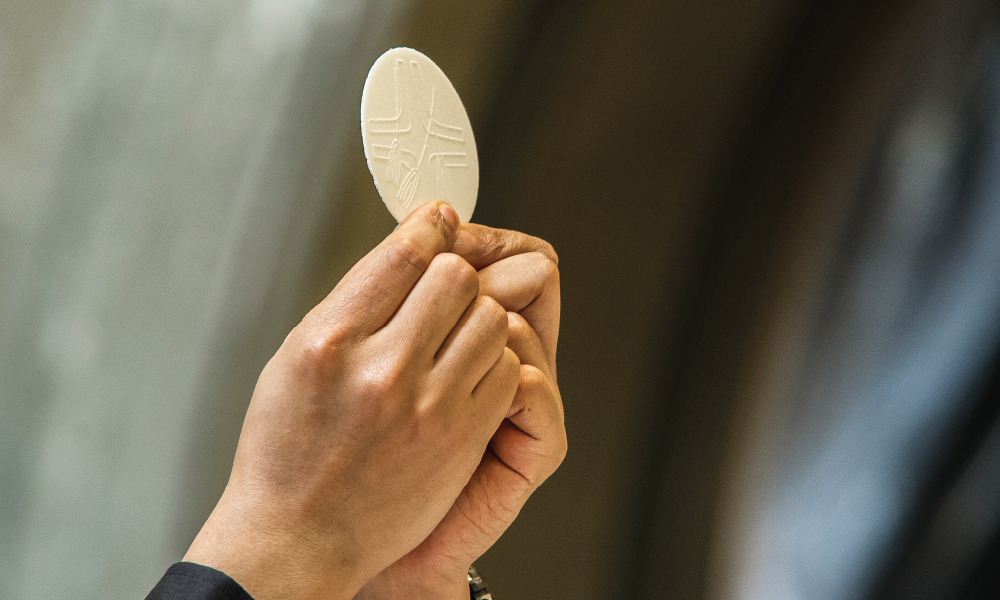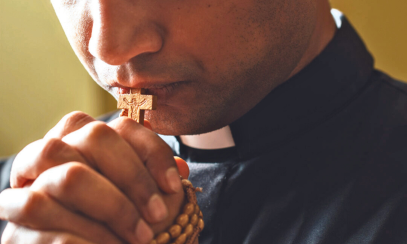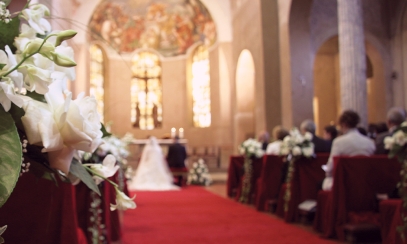
Nourished through Christ: The Sacrament of the Eucharist
The sacraments of initiation “ground the common vocation of all Christ's disciples, a vocation to holiness and to the mission of evangelizing the world. They confer the graces needed for the life according to the Spirit during this life as pilgrims on the march towards the homeland.” (Catechism of the Catholic Church 1533) The Eucharist (from the Greek word eucharistia, “thankfulness”) is the sacrament in which the true Body and Blood of Christ, who is truly and substantially present under the appearance of bread and wine, is received in holy Communion.
The sacraments of initiation “ground the common vocation of all Christ's disciples, a vocation to holiness and to the mission of evangelizing the world. They confer the graces needed for the life according to the Spirit during this life as pilgrims on the march towards the homeland.” (Catechism of the Catholic Church 1533) The Eucharist (from the Greek word eucharistia, “thankfulness”) is the sacrament in which the true Body and Blood of Christ, who is truly and substantially present under the appearance of bread and wine, is received in holy Communion.
This is the fourth post in our series exploring the seven sacraments of the Catholic Church. Check out a brief overview of all seven sacraments here.
Why do Catholics celebrate the Eucharist?
The Eucharist is called “the source and summit of the Christian life.” It is central to Catholic belief and practice because it memorializes Christ’s sacrifice on the cross, orienting all the Church, her people and sacraments toward the Eucharist – Christ himself. This sacrament completes Christian initiation in its fullness.
Who can receive the Eucharist?
Christians in full communion with the Catholic Church and in a state of grace may receive the Eucharist. (CCC 1385-1387, 1395, 1415)
Only validly ordained priests may preside at Mass and consecrate the Eucharist. (CCC 1411)
What happens during the Eucharistic liturgy?
The Mass has two main parts: the Liturgy of the Word and the Liturgy of the Eucharist. In celebrating the Eucharistic liturgy:
- The gifts of bread and wine are brought to the altar.
- The priest prepares the gifts of bread and wine, offering prayers that the host (bread) will become the bread of life and the wine will become our spiritual drink. After each, the people respond “Blessed be God for ever.”
- The priest then consecrates the host and wine, recalling Christ’s words: “Do this in memory of me.”
- The consecration concludes as the priest, in prayer, calls to mind the passion, resurrection and promised return of Christ at the end of time. The priest and the people then pray for the whole Church, the living and the dead, and for those who lead the Church.
- Then the priest invites those who will receive Communion to come forward.
The biblical basis for the Eucharist
Jesus instituted the Eucharist at the Last Supper, as described in the Gospels of Matthew, Mark and Luke, and the epistles of St. Paul. After Jesus took the bread and said the blessing, he gave it to his disciples and he said, “This is my body which is given for you; do this in memory of me.” (Lk 22:19)



